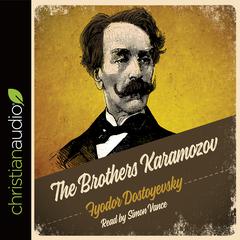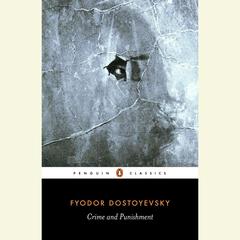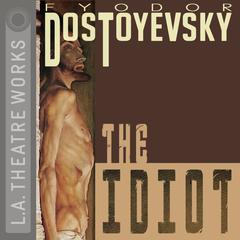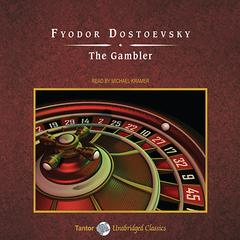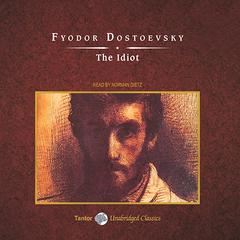 Play Audiobook Sample
Play Audiobook Sample
Poor People Audiobook
 Play Audiobook Sample
Play Audiobook Sample
Quick Stats About this Audiobook
Total Audiobook Chapters:
Longest Chapter Length:
Shortest Chapter Length:
Average Chapter Length:
Audiobooks by this Author:
Publisher Description
Both a masterpiece of Russian populist writing and a parody of the entire genre, Poor People is an early example of Dostoevsky’s genius.
Written as a series of letters, Poor People is the tragic tale of a petty clerk and his impossible love for a young girl. Longing to help her and her family, he sells everything he can, but his kindness leads him only into more desperate poverty, and ultimately into debauchery. As a typical “man of the underground,” he serves as the embodiment of the belief that happiness can only be achieved with riches.
This work is remarkable for its vivid characterizations, especially of Dievushkin, the clerk, solely by means of his letters to the young girl and her answers to him.
Download and start listening now!
"the format of the book is letters going back and forth between a girl and an older man. their history and relationship get explained to an extent by the letters, but not entirely. it was definitely a bummer, and the ending felt like it came too abruptly, but it was interesting in the sense that the two people writing had their own styles which also seemed to evolve. instead of it coming off like just a schizo author, it actually did read like if you just found a bunch of old bundled up letters between two people. not much more explanation than that, but interesting all on it's own, probably more so because it forces your imagination to fill in the gaps."
— Lis (4 out of 5 stars)
Quotes
-
“From the first pages of Poor People I understood that Dostoevsky wrote much better than I did and, as I continued...this impression grew.”
— Dmitry Grigorovich -
“To you, an artist, the truth has been revealed and proclaimed; it has come to you as a gift. So cherish your gift, and remain faithful to it, and be a great writer.”
— Vissarion Belinsky to Dostoevsky after reading Poor People -
“Patrick Cullen and Julia Emlen read the letters with deep emotion, exhibiting the love, frustration, and ultimate sorrow felt by the characters. Cullen’s portrayal of Dievushkin’s bouts of drunkenness, as well as his frantic efforts to save Dobroselova, are marvelous and intense.”
— AudioFile -
“Excellent…Both readers express the hopeless love and rage that the two correspondents capture in their heartfelt letters.”
— Kliatt
Poor People Listener Reviews
-
" What's the point of happiness if you're starving to death? I suppose this is a small (in scope and in size) novel for Dostoevsky, but damn it moved me. "
— Tj, 2/19/2014 -
" Great idea for a novel (two lovers who are too poor to be together writing to one another). The entire book is made up of letters to one another discussing their poverty and their despiration. Possibly a tad repetitive at times, but I enjoyed it all the same and was really able to believe that these two were truly in love with one another. Sad ending. "
— Isabelle, 2/18/2014 -
" I'll be reading this book my entire life, at this rate. 1997-2050. "
— Zach, 1/31/2014 -
" Read on the advice of my writing partner, Rob Callahan, it was indeen one of the most depressing books I have ever read. Plus I'm not sure if the translationw as entirely accurate. I believe that there are aspects of the story that were lost in the transition to English. "
— MontiLee, 1/12/2014 -
" Great look into the human mind; what makes one love and act, especially in desperation. I enjoyed the letter correspondence layout. His first publication, I believe, so interesting to see development of ideas and style. Another Russian beauty. "
— Gretchyn, 12/28/2013 -
" A very short read, which unfortunately takes a while to get going. But it captivates with its descriptions of poverty and society. Surprisingly post-modern ending. "
— Jacob, 12/1/2013 -
" Very emotional! And I loved the structure. Interesting to say the least. Didn't drag as much as it seemed to (if that makes any sense), and was happier than what was written. Altogether, quite enjoyable. "
— Alan, 11/22/2013 -
" Honestly, I'm not a fan of Russian epistolary literature, but I feel like i just need to inflict Dostoyevsky on myself every now and then. It's a good palate cleanser sometimes. At least Poor People/ Poor Folk is relatively short. But there's just so much melodrama.... "
— Sophia, 10/25/2013 -
" Brilliant story, the whole book composed of letters between 2 lovers, the 'he said, that he said, that he said' is reminiscent of Plato's dialogues, and the bits of meta-theater (stories within the stories) were INSPIRING! "
— Kristy, 4/27/2013 -
" Oh, young Dostoevsky. You're getting there. Good job. "
— Mamylon, 3/16/2013 -
" Dostoyevsky. Gloom, poverty, tuberculosis. Marvelous. "
— Brian, 3/12/2012 -
" Interesting first novel. Wish I had a better understanding of Russian culture and this time period. The two characters seemed a bit strange, but their plight as poor people in St. Petersburg came through despite the cultural barrier. "
— Colleen, 11/1/2010 -
" Dostoyevsky was an idiot at this time. FAIL. "
— Mateus, 4/16/2007 -
" Man Fyodor can write! These folks are poor and he ain't kidding. "
— Jessie, 8/18/2006 -
" Dostoevski's works are very depressing and this is not an exception. Slums and love between two totally different people. "
— Anna, 2/8/2006 -
" Makar Devushkin is a blithering idiot. I honestly could not stand his letters. What a boob. "
— Ariel, 4/26/2005
About Fyodor Dostoevsky
Fyodor Mikhailovich Dostoevsky (1821–1881) was a Russian novelist, journalist, and short-story writer whose psychological penetration into the darkest recesses of the human heart had a profound and universal influence on the twentieth-century novel. He was born in Moscow, the son of a surgeon. Leaving the study of engineering for literature, he published Poor Folk in 1846. As a member of revolutionary circles in St. Petersburg, he was condemned to death in 1849. A last-minute reprieve sent him to Siberia for hard labor. Returning to St. Petersburg in 1859, he worked as a journalist and completed his masterpiece, Crime and Punishment, as well as other works, including The Idiot and The Brothers Karamazov.
About the Narrators
John Lescault, a native of Massachusetts, is a graduate of the Catholic University of America. He lives in Washington, DC, where he works in theater.
John Lescault, a native of Massachusetts, is a graduate of the Catholic University of America. He lives in Washington, DC, where he works in theater.









